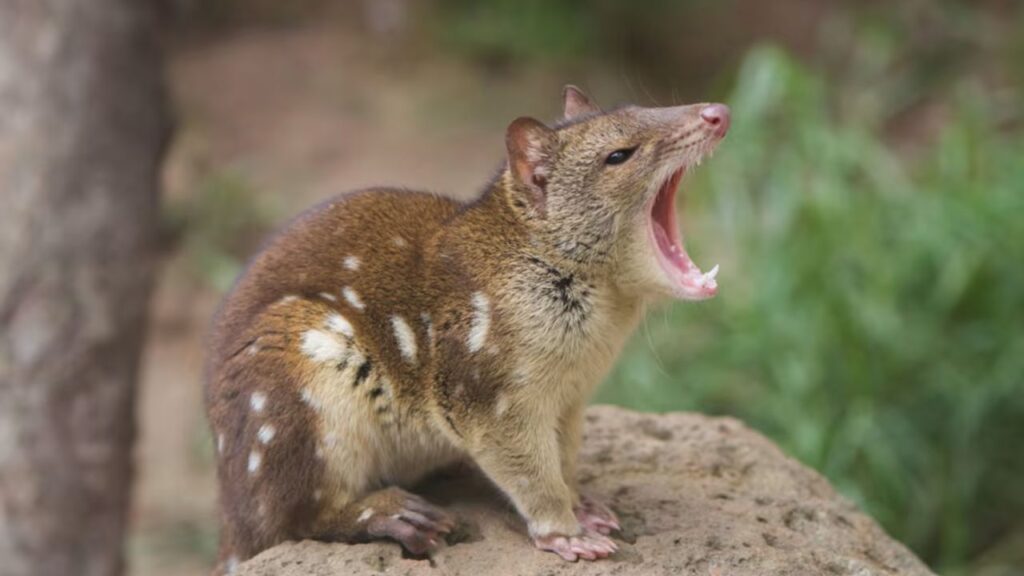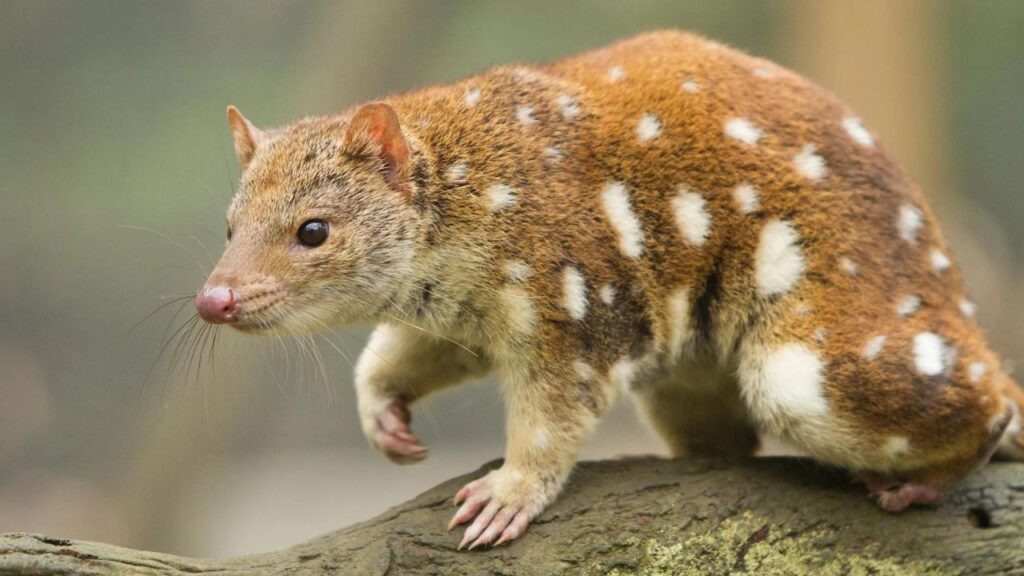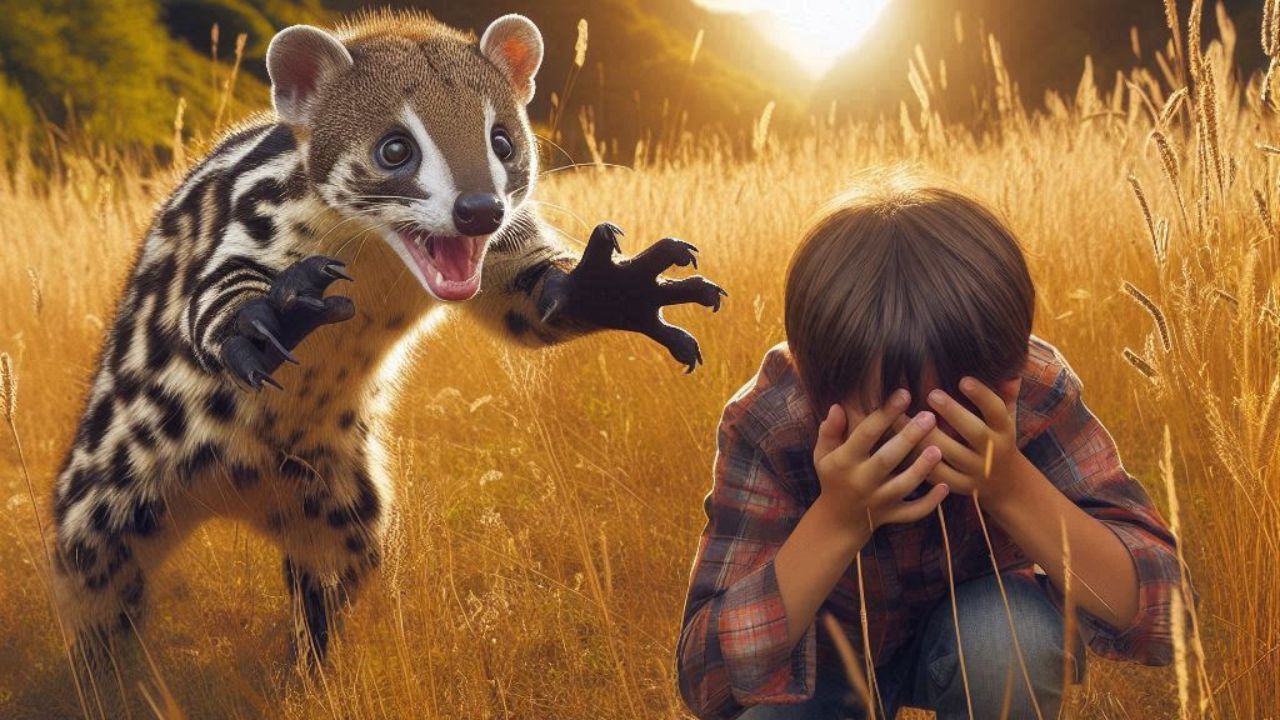Do Quolls Attack Humans? Quolls are generally shy and avoid human contact; they do not typically attack humans. However, if threatened or cornered, they may bite in self-defense.
Quolls, also known as native cats, are fascinating yet elusive marsupials found primarily in Australia and New Guinea.
Known for their distinctive spotted fur and predatory nature, these animals play a crucial role in their ecosystems as both predators and scavengers.
Despite their carnivorous diet and sharp claws, quolls are not typically thought of as dangerous to humans.
However, their somewhat fierce appearance and nocturnal habits can lead to questions about whether quolls might pose a threat to people.
This article will explore the behavior of quolls, particularly in relation to humans, to answer the question: Do quolls attack humans?
Contents
What Are Quolls?
Description and Habitat
Quolls are medium-sized marsupials belonging to the Dasyuridae family, which also includes Tasmanian devils and dunnarts. [Do Quolls Attack Humans?]
There are six species of quolls: the Eastern quoll, Northern quoll, Western quoll (also known as the chuditch), Spotted-tailed quoll, Bronze quoll, and New Guinea quoll.
Each species has its unique characteristics, but they generally share a few common traits: a slender body, pointed snout, sharp teeth, and a long tail.
Their fur is typically brown, black, or reddish, adorned with white spots that help camouflage them in their natural environment.
Quolls inhabit a variety of environments, ranging from dense rainforests and woodlands to savannas and rocky outcrops. [Do Quolls Attack Humans?]
The specific habitat depends on the species and region, but quolls are generally found in areas with ample cover and abundant prey.
These marsupials are solitary and territorial, often marking their territories with scent glands to ward off other quolls.
Behavior and Diet
Quolls are nocturnal predators, meaning they are most active during the night. Their diet consists of small mammals, birds, reptiles, insects, and carrion. [Do Quolls Attack Humans?]
They are opportunistic feeders, which means they will eat whatever is available, including fruits and vegetation if meat is scarce. Quolls are skilled hunters, using their keen sense of smell, sharp teeth, and claws to capture prey.
During the day, quolls seek shelter in dens, which they create in hollow logs, rock crevices, or burrows. These dens provide protection from predators and harsh weather conditions.
Quolls are known to be quite vocal, communicating with each other through a series of growls, screeches, and hisses, especially when defending their territory or during mating season.
Despite their predatory nature, quolls are not known to be aggressive towards humans. However, their solitary and territorial instincts can lead to defensive behavior if they feel threatened or cornered.

Do Quolls Attack Humans?
Quolls’ Natural Behavior Toward Humans
Quolls are naturally shy animals that prefer to avoid human contact whenever possible. They are more likely to flee than confront when they encounter humans.
This behavior is rooted in their survival instincts; as relatively small predators, quolls are vulnerable to larger animals and potential threats, including humans. Therefore, they tend to be cautious and elusive, making direct interactions with humans quite rare.
Quolls are nocturnal, meaning that most of their activities occur during the night when humans are less likely to encounter them. [Do Quolls Attack Humans?]
This further reduces the likelihood of any confrontations between quolls and people. In general, quolls do not see humans as prey or rivals and will avoid any unnecessary contact.
Defensive Behavior
While quolls do not typically attack humans, they may exhibit defensive behavior if they feel threatened or cornered. This can include biting, scratching, or hissing as a means of self-defense.
Such behavior is not indicative of aggression but rather a response to a perceived threat. For example, if a quoll is accidentally trapped or feels that its den is being invaded, it may react defensively to protect itself.
It is important to note that quolls are not naturally aggressive animals. Their primary response to danger is to flee rather than fight. However, if they are unable to escape or feel that their young are in danger, they may resort to defensive measures.
This behavior is similar to that of many other wild animals, which will defend themselves when they have no other option. [Do Quolls Attack Humans?]
Aggression Level
The overall aggression level of quolls towards humans is minimal. Unlike larger predators such as dingoes or crocodiles, quolls do not possess the size or strength to pose a significant threat to people.
Their diet consists mainly of small animals, and they do not view humans as potential prey. As a result, quolls have little reason to be aggressive towards humans. [Do Quolls Attack Humans?]
Even when quolls do exhibit defensive behavior, it is typically limited to a few warning bites or scratches. These actions are intended to deter the perceived threat rather than cause serious harm. Therefore, the likelihood of a quoll initiating an attack on a human is extremely low.
Past Incidents
There are very few recorded incidents of quolls attacking humans. Most encounters between quolls and humans have been benign, with the quoll either fleeing or showing mild defensive behavior.
In some cases, quolls have been known to enter human dwellings in search of food, but these instances are rare and usually occur in rural or remote areas where quolls live in close proximity to people.
In the few instances where quolls have interacted with humans, the outcomes have generally been non-threatening. For example, a quoll may enter a campsite or backyard looking for food scraps, only to scurry away when approached by a human.
Any aggressive interactions have typically involved humans unintentionally provoking the animal, such as by trying to handle it or invading its space.
Comparison with Other Wild Animals
Compared to other wild animals of similar size, such as possums or raccoons, quolls are relatively docile. Their primary instinct is to flee from perceived threats rather than confront them.
Possums, for instance, are known to hiss or play dead when threatened, while raccoons can be more aggressive, especially when protecting their young.
Quolls, on the other hand, prefer to retreat to their dens or hide in the underbrush when they sense danger. [Do Quolls Attack Humans?]
However, like all wild animals, quolls should be respected and given their space to avoid any potential defensive behavior.
It is important to remember that quolls, despite their small size, are still wild animals with sharp teeth and claws, and they should not be approached or handled without proper knowledge and precautions.

Are Quoll Attacks Dangerous?
Potential Risks
While quoll attacks on humans are rare, a bite or scratch from a quoll can pose some risks, mainly due to the potential for infection.
Quolls have sharp teeth and claws that can cause puncture wounds, which, if left untreated, could lead to bacterial infections.
These infections can be particularly concerning in remote areas where medical care may not be readily available. [Do Quolls Attack Humans?]
Another potential risk is the transmission of zoonotic diseases, which are diseases that can be passed from animals to humans.
While quolls are not known carriers of any significant zoonotic diseases, it is always wise to exercise caution when dealing with wildlife. Any animal bite or scratch should be treated seriously to prevent complications.
Treatment and Safety Precautions
If a quoll bite or scratch occurs, it’s essential to clean the wound thoroughly with soap and water and seek medical attention to prevent infection.
It is also advisable to consult a healthcare professional about the need for tetanus shots or antibiotics. In some cases, wound cultures may be necessary to identify any bacteria present and determine the appropriate treatment.
Beyond treating injuries, safety precautions should also include avoiding situations where quoll interactions might occur. [Do Quolls Attack Humans?]
This means being mindful of your surroundings when camping, hiking, or living in areas where quolls are present. Keep food securely stored to avoid attracting quolls, and be cautious when approaching areas where quolls may have dens, such as hollow logs or rock crevices.
How to Avoid Quoll Encounters?
Habitat Awareness
To minimize the chances of encountering a quoll, it is important to be aware of their habitats. Quolls are primarily found in remote, natural settings away from urban areas. They prefer environments with ample cover, such as forests, woodlands, and rocky areas.
If you are camping or hiking in regions known for quoll populations, stay vigilant and avoid leaving food scraps that could attract them.
Understanding the type of environment quolls inhabit can help you avoid accidentally stumbling upon one. [Do Quolls Attack Humans?]
For example, if you are exploring a forested area at night, be aware that quolls may be nearby, especially if there is abundant prey available.
By knowing where quolls are likely to be found, you can take steps to avoid encounters and minimize the risk of disturbing them.
Best Practices for Safety
- Do not attempt to feed or handle quolls: Feeding wild animals can lead to dangerous situations for both the animal and the human. Quolls are capable of finding their food and do not need human intervention. Handling quolls can also lead to bites or scratches, as they may feel threatened.
- Keep a safe distance if you spot a quoll in the wild: Observing quolls from a distance allows you to appreciate their beauty and behavior without putting yourself at risk. Use binoculars or a camera with a zoom lens to get a closer look without getting too close.
- Ensure that any pets or small children are kept away from quoll habitats: Pets, especially dogs, may be curious about quolls and attempt to chase or attack them. This can lead to injuries for both the pet and the quoll. Similarly, small children may not understand the need to keep a safe distance from wild animals.
- Seal off potential den sites around homes or campsites to avoid attracting quolls: Quolls may seek out dens in hollow logs, under buildings, or in other secluded areas. By sealing off these potential den sites, you can discourage quolls from taking up residence near human habitation.
The Importance of Quolls in the Ecosystem
Role as Predators and Scavengers
Quolls play a significant role in their ecosystems as both predators and scavengers. By controlling populations of small mammals, birds, and insects, they help maintain a balance within their habitats.
As scavengers, quolls also help clean up the environment by consuming carrion, which reduces the spread of disease and supports nutrient recycling. [Do Quolls Attack Humans?]
Conservation Status
Several species of quolls are currently listed as endangered or vulnerable due to habitat loss, introduced predators like foxes and cats, and competition for food resources. Conservation efforts are crucial to protect quoll populations and their habitats from further decline.
These efforts include habitat restoration, predator control programs, and public education to raise awareness about the importance of quolls in maintaining healthy ecosystems.
Final Verdict
While quolls are carnivorous predators, they are not a threat to humans. They are naturally shy animals that prefer to avoid human interaction, and quoll attacks on humans are extremely rare.
Typically, quolls will only exhibit defensive behavior if they feel threatened or cornered. By understanding quoll behavior and following safety precautions, it is possible to coexist peacefully with these unique and vital creatures.
See Also: Do Stingrays Attack Humans? The Hidden Threat!
FAQs
Are quolls aggressive towards humans?
No, quolls are generally not aggressive toward humans and avoid contact whenever possible.
What should I do if I see a quoll?
Keep a safe distance and do not attempt to handle or feed it. Enjoy observing it from afar. [Do Quolls Attack Humans?]
Can quolls carry diseases that affect humans?
While quolls can carry bacteria that could potentially cause infection from bites or scratches, they are not known to carry diseases that directly affect humans.
How common are quoll sightings in urban areas?
Quoll sightings in urban areas are rare, as they prefer natural habitats away from human settlements.
Are there any conservation efforts for quolls?
Yes, various conservation efforts aim to protect quoll populations and their habitats from threats like habitat loss and introduced predators.
Conclusion: Do Quolls Attack Humans?
Quolls are unique marsupials with intriguing behavior and a vital role in their ecosystems. [Do Quolls Attack Humans?]
While they pose little to no threat to humans, it is important to respect their space and understand their natural behavior to coexist peacefully with these fascinating creatures.
By raising awareness about quolls and supporting conservation efforts, we can help ensure that these incredible animals continue to thrive in the wild for generations to come.

Hello, I am Rosa Ellis, a mother of two and a wildlife blogger. I grew up in New York City, but I love exploring forests. I’ve traveled to places like Yellowstone National Park and the Amazon Rainforest to see animals up close. I know a lot about animal behavior and which animals can be dangerous to humans. Thanks for visiting my blog!

